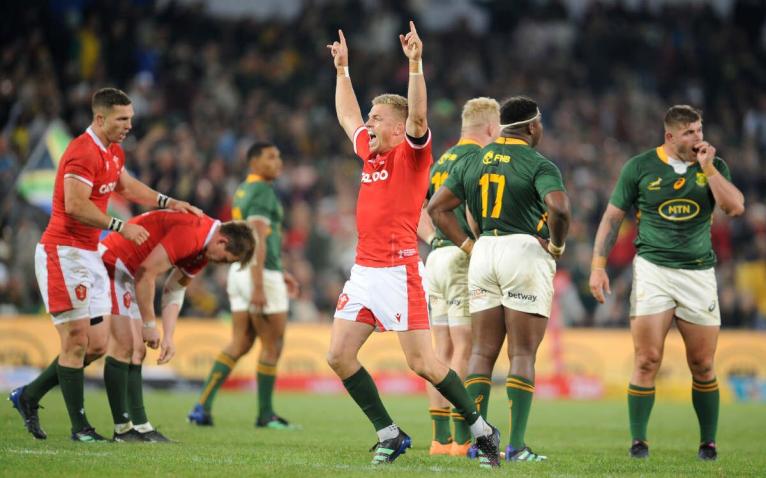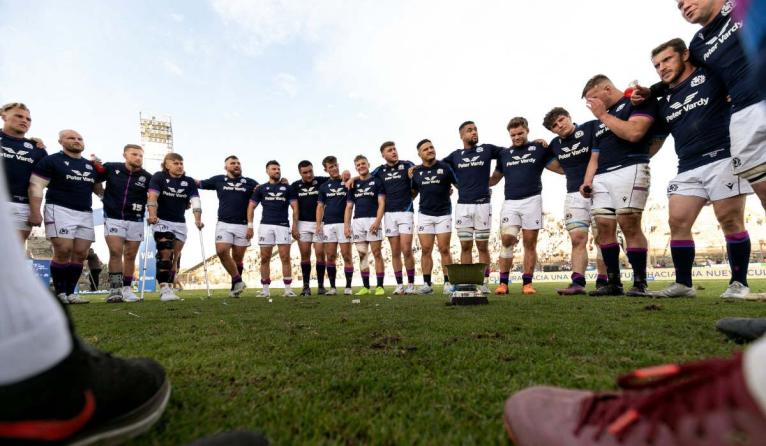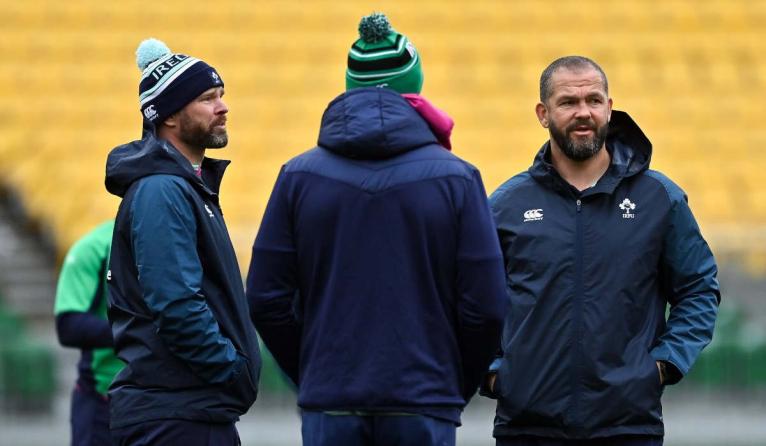After a dispiriting 4-0 loss last weekend, few were speculation on a complete reversal in fortunes from the Northern Hemisphere. The fun started early on as the All Blacks were authors of their demise as their discipline deserted them and Ireland won at a canter, clearly the better side. Eddie Jones, under pressure, kept up the good work as England put in their best quarter in years to hold out for a 25-17 win. Only hours later, Wales scored and converted a last-minute try to beat South Africa on their own patch for the first time. Not to be left out of festivities, Scotland turned it on for a classy second-half display, as they ran out 29-6 winners in Salta against Argentina.
The results set up a seismic weekend of Test rugby…
Dominant in Dunedin, Ireland fear no one
There are a number of amazing things about visiting New Zealand, the stunning landscape, the warmth of the people, the fact that if your taxi driver is from Syria – yes Syria – China, or downtown Wellington, they’ll talk rugby.
But the most surprising discovery on this tour has been the sight of All Blacks appearing vulnerable, something no Irish fan ever thought possible.
We remember Hamilton, 2012. 60-0 that one finished. Some of us with longer memories recall Wellington 1992 – 59-6. You don’t need to know who won it.
For 111 years only one team did in this rivalry. Then came Chicago in 2016. A ghost was exorcised. Next came the Aviva in 2018, a first win for Ireland on home soil against the All Blacks. The sequel was in 2021. Same stadium, same result.
Each Irish win has been followed by a New Zealand reprisal, though – Dublin in 2016, Tokyo in 2019, Eden Park just over a week ago.
But there is something about Saturday’s win that felt different. For once the result was never in doubt, not after Angus Ta’avao was red carded on 30 minutes. By then, Ireland were ten points clear and cruising, their old timers, Johnny Sexton and Peter O’Mahony, showing the kind of leadership the Tories could only dream of, their youngsters, Dan Sheehan and Caelan Doris suggesting they are the ones to inherit the captaincy when the veterans go.
In Dunedin’s wonderful stadium, you didn’t have a sense of history unfolding, mainly because of the matter of fact way that Ireland reacted to the win, a brief group huddle following the final whistle, a quick exit to the dressing room.
Clearly they are on a mission to achieve something bigger: a series win. That hasn’t been done here since the French visited in 1994. The Lions remember have only once won a series here. Surely Ireland can’t match that total on Saturday?
Perhaps they can because these All Blacks are under pressure. By chance, we ended up in their team hotel on Saturday, finishing our work in a quiet room just off the restaurant where they had their post-match meal. There was silence, like being at a wake without the corpse.
Jones serves the perfect riposte to critics
For twenty minutes, it was as if England had rewound the dial to 2019. With a big grin, ‘Big’ Billy Vunipola relished pumped those enormous legs to carry over the gainline, Maro Itoje was thrown airborne to dominate the skies and Ellis Genge skittled would-be Australian defenders crazy enough to try and haul him down. With Owen Farrell, a muscular presence in midfield, scrapping for every inch and ticking the scoreboard over as they sprinted to a 19-0 lead, it was a performance as frustrating as it was exhilarating. Why couldn’t this wildly inconsistent side do this on a regular basis?
Thirty minutes later, England were fighting for their lives, with the score 22-17 and Australia kicking to the corner for an attacking lineout. In a microcosm it highlighted England’s split personality. One moment sublime, the next lacking belief and unable to box their way out a tight corner.
By the final whistle, however, it was all smiles, as despite Marcus Smith’s yellow card, Eddie Jones’ men survived a stern examination of their character, despite a spirited fightback from an injury-hit Wallaby side, who lost Jordan Petaia after three minutes through concussion, and a horrible looking ACL knee-injury to his replacement, Iziaia Perese. They scored through Taniela Tupou and Samu Kerevi, and were it not for a lack of execution in the red zone, Eddie Jones may not have enjoyed his visit to the Suncorp where he has won seven Tests on the spin.

The 25-17 win sets up a titanic decider in Sydney where England will be without Sam Underhilll and Itoje, who left the field due to failed HIA’s, and Tom Curry, whom they lost in the first Test. There is also a doubt over Jack Willis, who pulled out of the 23 late due to a rib injury. For both sides, it will be a case of last man standing, as they field patched-up sides, but Jones will be thrilled with Jack van Poortvliet’s Ben Young’s tribute act, the continuing stability of Freddie Steward at the back, and the increased ball-carrying of Will Stuart in the loose. Carrying on the Leicester Tigers spine, Guy Porter was defensively sound and made a few notable carries to show he can cut it at Test level.
With 12 games until the World Cup, if England can win the Series and kick on in the Autumn, they can start to play catch-up with the likes of Ireland and France, who are ahead of them in their preparations for France.
Wales find backrow balance
Arguably the most balanced Welsh backrow in recent years was Dan Lydiate, Taulupe Faletau and Sam Warburton.
When Warburton retired in 2017, Justin Tipuric, every bit as world-class, filled the No 7 jersey with aplomb. Meanwhile, Dan Lydiate slipped out of the Test reckoning as a more lightweight, offensive blindsides were selected, with Josh Navidi, especially, coming to the fore. After a three-year hiatus, a cruel injury after 12 minutes against Ireland in 2021 seemed to have ended the then 33-year-old’s Test career, yet Wayne Pivac name checked Lydiate on several occasions as being in his thinking. Seb Davies and Christ Tshiunza have been trialled as the ‘big No 6′, Pivac prefers but the ageing Mid-Walian was preferred for the South African job, despite murmurings of discontent.
With Tipuric out for a year, the emergence of Tommy Reffell has coincided with Leicester Tigers reaching the pinnacle of the English game and the Pencoed-born openside coming to the fore. On Saturday, the backrow faced the intimidating Marcell Coetzee, former World Player of the Year, Pieter Steph-Du Toit and URC Player of the Season, Evan Roos, yet bested the celebrated trio. Lydiate stopped the carriers at source, repeatedly stopping Bok behemoths in their tracks with 18 tackles, and Reffell, an out and out openside, aptly nicknamed ‘Tommy Turnover’, clamped onto the ball to win three precious turnovers.

Winning his 91st cap, Faletau, for his part, used his deft footwork to explode from the base of the scrum and set up various exit strategies when Wales were under pressure, and didn’t shirk the hard graft with nine tackles. In essence, they worked in Wales’ back-row trio will have to bang in another industrious display this Saturday, but the trio are in pole-position with just 12 games to the World Cup.
While the likes of Jac Morgan, James Botham, Taine Basham and Ross Moriarty, further deepen the well of reserves at 6 and 7, it is the peerless Faletau who will have to be managed in the next 14 months, with no obvious successor at No 8. Wales have a depth issue in certain areas, but the backrow is not one of them.
Scotland bite back
Gnawing questions have been asked of Gregor Townsend, the Scotland coach, for some time. What is his team trying to achieve? What is their identity? How can they be so compelling one week and so cataclysmically poor the next? Does this yoyoing group have what it takes to be anything more than nearly men in the Six Nations? Above all, are they careering towards anything but a pool-stage exit from next year’s World Cup, when they are in a group featuring Ireland, a team Townsend has never beaten, and South Africa, the mighty world champions with a power game Scotland cannot match?
On Saturday night in Salta, they at least provided a few answers. Though it would be hard for Scotland to play as tamely as they did in Jujuy a week earlier, they gave it a decent shot in an awful first half, aided by Argentina’s own significant drop in form. Townsend spoke last week about the need for Scotland to generate their own momentum in these stuttering contests, pockmarked by error and infringement. In that regard, Scotland brought a new intensity, direction and belligerence to bear.
Their scrum, pulverised in the opening Test, improved out of sight. Their carrying was harder and more purposeful; their defence stingier. Three times, Argentina made it to the Scottish line, and three times were held up short or stripped of possession with the last-gasp wrench of an arm.

Their breakdown work, with Hamish Watson and Rory Darge restored to the back-row, was excellent. And with Ben White fizzing at scrum-half, they wielded a greater menace, too. They got the ball into the hands of their big strike runners, men who seldom got a touch in Jujuy. Duhan van der Merwe had possession three times a week ago; on Saturday, he made 11 carries for over 70m, broke four tackles and delivered three offloads.
This felt like a significant win. Scoring 21 unanswered points and four unanswered tries away from home will breathe confidence into a side which has toiled far too often this year. Townsend said in the aftermath the performance “scratched the surface” of the team’s potential, and he is right. Scotland remain a long way from where they want and have to be. To generate more feelgood, to show some semblance of consistency, they must prevail in Santiago next Saturday. A 2-1 series victory against a highly motivated Argentine side laden with European club luminaries would be laudable. But a failure to back up big wins has long plagued Scotland. With win-or-bust pool matches only 14 months away, this decider will test their mettle.
Farrell has midas touch
First it was with England in 2012; then with Ireland in 2016. He did the business with the Lions here on their New Zealand tour a year later, masterminded the shut-out at the Aviva in 2018 and has now beat them twice as Irish head coach.
Andy Farrell has it. He moulds teams, he motivates players; he holds his nerve when his restructured game-plan is failing to click.
When he came into the head coaching position with Ireland after the 2019 World Cup, he succeeded the most popular coach the country had ever had.
Plus he was successful, Joe Schmidt winning three Six Nations championships and being the one in charge when the All Blacks were finally beaten after 111 years trying.

Farrell was by his side that day in Chicago and for the sequel in 2018.
But he is the gaffer now. He is doing things his way, tinkering with Schmidt’s gameplan, walking the tightrope between providing his players with enough detail to help them learn but the right amount of freedom to keep them fresh.
The jackal brothers
One of the interviews of the weekend came not from a player or coach, but from Gus Watson, brother of Hamish, on the streets skirting Estadio Padre Ernesto Martearena on Saturday evening. Rugby folk would probably describe Gus as “loose”, all smiles and shrugs and banter. He was a genial presence in the Salta heat, just a couple of hours after landing from Buenos Aires. He follows Hamish around the rugby world.
“He’s here?” the flanker chuckled to Sky Sports reporter Rupert Cox in his post-match interview. “How did that interview go?”
The Watson brothers have a successful baseball cap business away from rugby and a bond palpable in their separate television cameos. It was fitting that Gus should make it to northwest Argentina to watch his brother win a 50th Scotland cap.
The Argentine broadcasters named Watson man of the match in a brilliant individual showing. He muscled over for the game’s opening try, vindicating Scotland’s call to go for the corner rather than a straightforward shot at the posts. He carried nine times and made 11 tackles. He wedged himself over Argentine ball, a persistent nuisance to the home cleaners.
Watson formed a terrific jackal pairing with Rory Darge, the 22-year-old Glasgow man who is already a totem for the Warriors. These two are cast in a similar mould and their all-action style gives Scotland such potency over ball.
Seven years have passed since Watson’s inauspicious beginnings in Test rugby. Twenty-nine minutes off the bench in a heinous Murrayfield loss to Italy. Watson was sin-binned as Italy ground over for the match-winning score which gave them, until very recently, their latest Six Nations away win.
Few have been so consistently excellent for Scotland in the years that followed. A Six Nations player of the championship award, a British and Irish Lions tour, admiration, recognition and offers from around the continent. He had been stuck on 49 caps since a bout of covid robbed him of hitting the half-century during the Six Nations. Trust Watson to deliver a man-of-the-match performance on number 50.



Comments
Join free and tell us what you really think!
Sign up for free